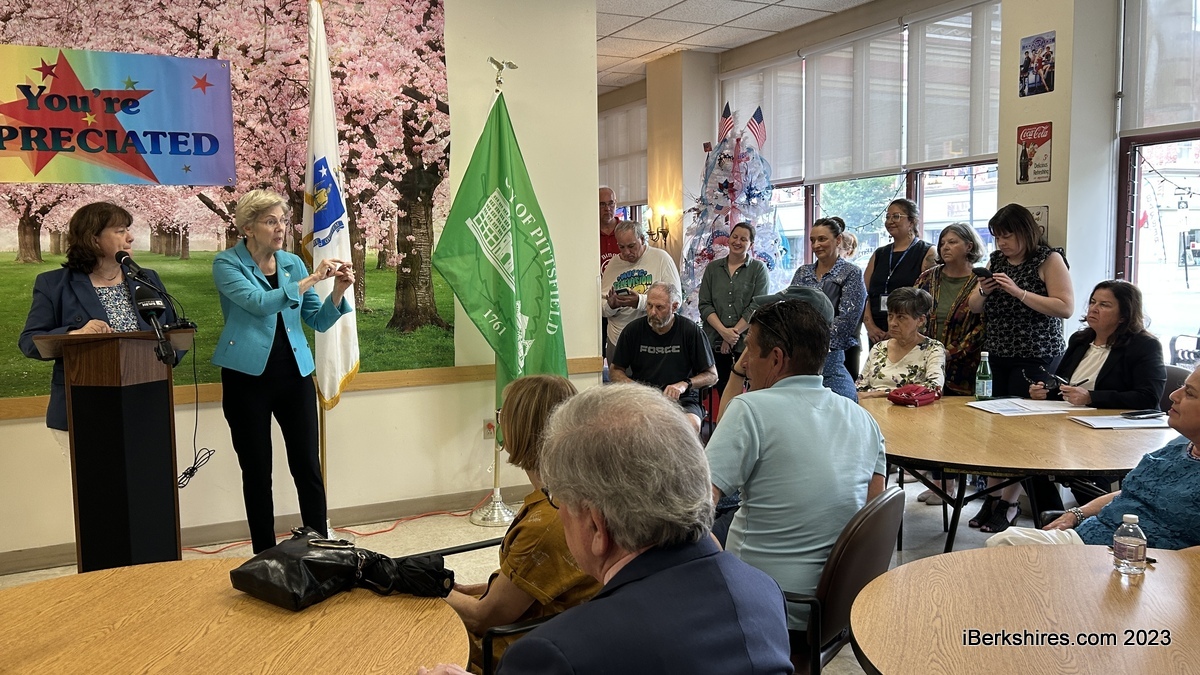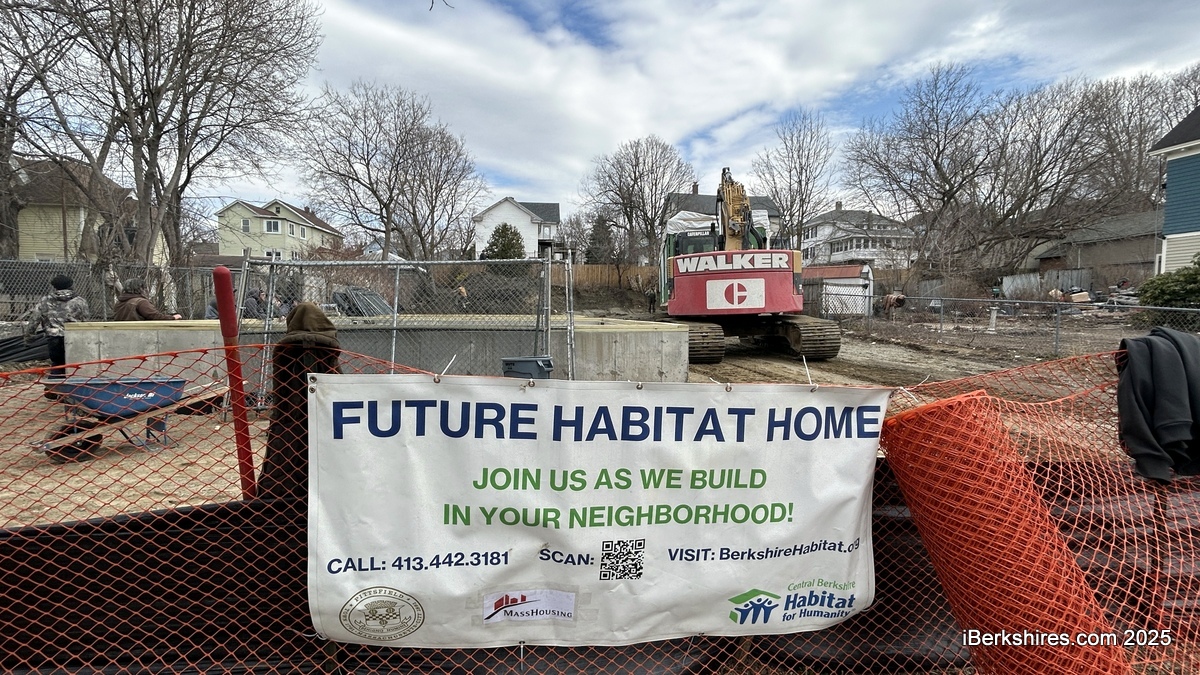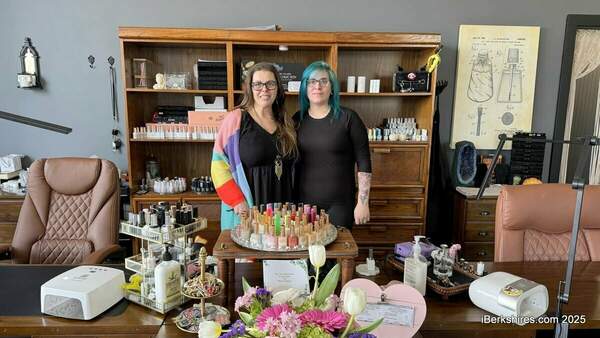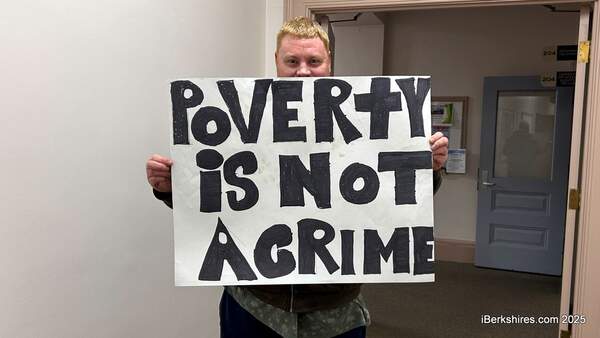Senator Warren Details Senior Advocacy in Pittsfield

PITTSFIELD, Mass. — U.S. Senator Elizabeth Warren spoke on Friday at the Ralph Froio Senior Center of her legislative efforts to aid residents 65 years and older.
To a crowded common room, Warren expressed gratitude for the residents' willingness to kick off the weekend by mulling important issues that the commonwealth and wider nation face.
"When I go down to Washington I am so proud to be from Massachusetts," she said.
Warren largely spoke of the provisions she helped secure to lower the cost of prescription drugs through the Inflation Reduction Act and her efforts to make hearing aids available over the counter.
These include capping insulin co-pays for people who are diabetic at $35 per month, capping out-of-pocket prescription drug costs for people who have Medicare Part D at $2,000 starting in 2025, and providing free recommended vaccinations to Medicare and Medicaid recipients.
Mayor Linda Tyer said she and the senator have had a wonderful partnership over the last eight years and have worked together on a number of projects.
"I admire you for being a champion," she said. "You are a champion for Pittsfield and you are a champion for Massachusetts."
In 2014, Warren was visiting with a friend and the question of why a hearing aid costs multiple times more than an iPhone came up.
"Think of how simple the hearing aid is compared to an iPhone and yet, at a time when an iPhone was under $1,000, hearing aids were running, a pair of them would run $5,000 or more sometimes," she said.
She said it had been basically a monopoly with regulations put into place that allowed an exorbitant price.
Warren explained to a senior who is a Republican that if the law was changed at a federal level so that hearing aids could be sold over the counter there would be competition from providers and new ones could enter the market.
"And so we got a bill through, got it signed into law by [former President Donald Trump,]" she said.
"The [U.S. Food and Drug Administration] then dragged its feet on actually implementing. The Biden administration stepped up and it is now possible to buy hearing aids over the counter and what used to cost thousands is now down."
She highlighted the importance of the equipment to people who are hearing impaired.
"This is not just about turning the TV up louder. This is not just about the fact that you can't hear your grandchildren," Warren said.
"This is about genuine isolation, that people who have hearing loss and don't get hearing aids don't go out. They don't talk to people. They won't go to the grocery store. They quit driving their cars, and they actually are more at risk for dementia. So this is about health and helping people live healthier lives and lives where they are more engaged."
For the first time, there will be a Medicare program for negotiating the price of drugs with 10 drug companies starting next year.
Warren described this as being the "crack in the wall," reporting that one of the companies is in court saying it has the constitutional right to charge what it wants without negotiations.
"My view on that is bring it on," she said. "So we're about to start that and you start with 10, I'm ready for 20, I'm ready for 40. This is going to change the drug market overall and all I can say is it is about time."
She and Vermont's U.S. Sen. Bernie Sanders have formulated a bill that would extend the life of Social Security so that there is no dip in benefits to the end of the century and raise the benefits by $200 a month.
Warren is also concerned about private equity ownership of nursing homes.
"I just saw a study the other day that showed that during COVID, nursing homes owned by private equity versus nursing homes that were not owned by private equity, those owned by private equity had a 40 higher mortality rate during COVID," she reported.
"So we're talking life and death. We're not just talking they don't have this nice paint job. We are talking about the treatment and services that people receive every day."
Residents were given a chance to voice concerns about issues that affect themselves and are observed in the community.
Human Services Advisory Council Chair Rosalind Kopfstein pointed out that federal Community Block Grant funding, which serves seniors and many others, has been reduced over the last 15 years. She also expressed concern for the gap in services and the people that are not being reached.
Warren feels that the government should allow communities to allocate resources as they see fit.
"I think this is the only way we're going to get to move forward on housing. We have a housing crisis and here in Massachusetts but all over this country and housing of every kind. We need housing for seniors, we need housing for people with disabilities, we need housing for first-time homebuyers, we need multifamily housing for renters, we need housing for people who don't have any housing at all. We need all of the above," she said.
"But the federal government should not come in and say you're gonna build an apartment house over there and 10 senior living spaces over there. It's a total disaster in my view. What the federal government should be doing, what I'm pushing for is we'll build the programs and fund them, I hope, but we will provide the funding, you figure out what works to get more housing to the people in your area and we try to be a good partner and try to get the state to partner up with us so that projects that otherwise would just not financially viable become viable because you're getting some boost from the federal government, some boost from the state government."
She later pointed out that there is a struggle to keep Meals on Wheels funded at a federal level which she fights for every year.
"Turns out that what the numbers show is that if you have somebody dropped by every day with a meal, it costs a few dollars but it's also a wellness check and that more people, not everybody, but more people can stay at home," Warren explained, adding that when he program is withdrawn more people end up in nursing homes at a much greater cost.
The senator was joined by Everett Handford, New England regional director of U.S. Department of Health and Human Services.
"The Biden-Harris administration and the U.S. Department of Health and Human Services are committed to health equity and health access for all families. Now that the public health emergency has ended, the president is committed to ensuring that individuals and families do not lose their health coverage. States will now begin to restart their yearly Medicare, Medicaid, and ship eligibility reviews. This means that states will use the information that they have to decide if current recipients still qualify for health coverage," he said.
"I'm here to let you know and encourage you all to please work diligently with the Mass Department of Health and Human Services as well as the Health Connector to ensure that you're still receiving the health coverage that you all rightly deserve. I will also say that the bottom here was the administration and the U.S. Department of Health and Human Services are keeping to their promises to deliver a lower cost for American families so that they can access the health care that you all rightly deserve."
Tags: senior citizens, Warren,


















